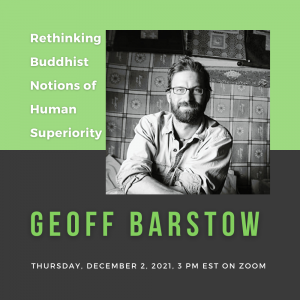Buddhism & Posthumanism Series - Rethinking Buddhist Notions of Human Superiority
When and Where
Speakers
Description
 For the second event in the Buddhism and Posthumanism series, Geoff Barstow will present his talk “Rethinking Buddhist Notions of Human Superiority” and join Rory Lindsay and Frances Garrett for a conversation about our multi-species environment. Geoff will also discuss his research on vegetarianism in Tibet and animal intelligence.
For the second event in the Buddhism and Posthumanism series, Geoff Barstow will present his talk “Rethinking Buddhist Notions of Human Superiority” and join Rory Lindsay and Frances Garrett for a conversation about our multi-species environment. Geoff will also discuss his research on vegetarianism in Tibet and animal intelligence.
Buddhist thinkers have often claimed that human life is superior to animal life by virtue of our superior intellect and capabilities, an understanding that has strongly informed how Buddhists engage with non-human animals. Many of the claims about human superiority in Buddhist texts, however, are made with the rhetorical aim of motivating humans to use their lives wisely. If we take this context into consideration, the Buddhist textual tradition can be fairly interpreted as more open to animal intelligence than it sometimes seems. Further, contemporary scientific evidence of animal intellectual and emotional abilities means that humans and animals may not be as far apart as the Buddhist tradition often assumes. For both of these reasons, Geoffrey Barstow argues that the tradition should reconsider its assumptions about the human / animal distinction, moving firmly towards a post-human understanding of our world.
→ Registration is required - click on the link at the top right of this page.
About the Buddhism and Posthumanism Event Series 2021-22
The Ho Centre is thrilled to announce its 2021–22 speaker series Buddhism and Posthumanism: Questioning the Place of Humans in Multispecies Environments, which features climate researchers, activists, and Buddhist studies scholars focused on reconsidering the place of humans in an interconnected world. This lecture series is organized by Rory Lindsay, Assistant Professor, and Frances Garrett, Associate Professor of Buddhist Studies in the Department for the Study of Religion at the University of Toronto.
What is posthumanism? Posthumanism acknowledges that humans are an animal like any other and that we are but one equal element in the diverse web of nature. As such, posthumanism also acknowledges that the pursuit of human progress should not presuppose human supremacy, and that non-human animals should have the conditions necessary for their own flourishing as well. In light of humanity’s current course, it recognizes too that destructive environmental practices harm a vast network of beings, humans and non-humans alike, threatening our collective futures.
Many aspects of Buddhist traditions resonate with these ideas, such as Buddhist models of self-cultivation and of generating compassion for all beings. Yet deeply embedded notions of human superiority sit in tension with these same posthumanist ideas. The aim of this series, then, is to explore Buddhist resonances, departures, and contributions to posthumanist attempts to meet the present climate emergency, and to consider paths forward involving individual and collective action.
This series will feature Zoom meeting conversations with five leading figures in the field, all talks will begin at 3pm EST. These are:
November 4, 2021
Leah Stokes, Associate Professor, University of California Santa Barbara
December 2, 2021
Geoff Barstow, Associate Professor, Oregon State University
January 27, 2022
Janet Gyatso, Hershey Professor of Buddhist Studies, Harvard University
February 10, 2022
Kalzang Dorjee Bhutia, Asian Studies Program, University of California Riverside
March 24, 2022
Dekila Chungyalpa, Director of the Loka Initiative, Center for Healthy Minds and Healthy Minds Innovations, University of Wisconsin–Madison


